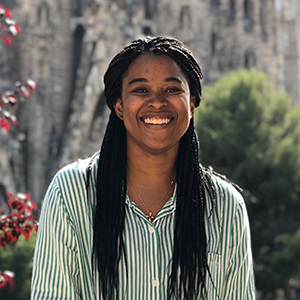In July of 2023 the Hogg Foundation hired Taylor Payne as its newest postdoctoral fellow. In this role she supports the development of the foundation’s uses of data to achieve health equity. Her main research interests focus on identity, discrimination, educational equity, burnout and well-being. In this Q&A we talk with Taylor about the significance of her role, and her goals for the future.
You just recently completed your doctorate. Through its Moore Fellowship and Frances Fowler Wallace Memorial Award, the Hogg Foundation has supported numerous early career academics of color. What major milestones and challenges marked your own Ph.D. journey?
I would not have been able to complete my degree without the support of my family, mentors and advisors. Learning the world of academia and what is expected of you can be a bit of a journey, so I am thankful for the amazing people I met along the way – and those who challenged me to think about social issues from multiple lenses. My doctoral journey took a bit longer than I had anticipated because I was about to start the comprehensive exam phase of my program when the pandemic hit. On top of the height of the pandemic being a challenging time it also caused me to reflect upon the work I was doing, and really figure out what was important to me and what work I wanted to continue doing. From this reflection I landed on my dissertation topic, “Experiences of burnout for ethnically minoritized doctoral students.” This is probably my proudest work at the moment.
Tell us about your current position with the Hogg Foundation. How are you finding the adjustment, and what have you had the chance to work on?
Currently I serve as a postdoctoral fellow with the Hogg Foundation. In my role I am working to advance mental health equity through data. This means using data to show disparities that might exist in our communities, looking at current research and interventions to see if they are culturally responsive for the population they are being used with, and engaging in critical quantitative inquiry. The adjustment has been great as everyone at Hogg is super welcoming and genuinely friendly people. Currently, I am looking at one of the Centers for Disease Control and Prevention’s datasets about youth behaviors and examining suicidality of queer youth, and seeing which states are experiencing higher rates.
What unique skills or experience do you bring to your work?
I was fortunate to receive a very interdisciplinary training in my doctoral studies. I had the opportunity to teach classes, work with first-generation undergraduate students, and be in an extremely diverse research lab full of talented women. These experiences really helped me shape my work and keep my work grounded in current day issues. These experiences have also given me the ability to approach research from a multicultural and intersectional way.
I would consider myself to be both a qualitative and quantitative researcher. The method I use really just depends on the research question. I do my best to center the experiences of the people I am working with in my work and acknowledging how different social systems and inequities and impact people.
Tell us more about the Data Justice for Mental Health Initiative. What do you see as its future potential?
Texans deserve to have the highest quality of information available to support community well-being and mental health throughout the state. To the extent that is lacking, harm is being done. Data Justice for Mental Health seeks to improve the quality of information and evaluation used to support mental health and community well-being in Texas. The initiative is still in a planning phase, but we envision championing repair, reflection, and change in the data and evaluation ecosystems that impact the mental health of Texas communities.
What is your favorite thing to do that is unrelated to your role at Hogg? Relatedly, what do you like to do to take care of your own well-being?
When not working I really enjoy spending time with my people (family, friends, my dog lol). I also like reading, and recently I’ve been thinking about picking up a craft or starting piano lessons. Something where I can focus my energy and mind outside of work. Conversely, I am a big reality TV fan, so I also like not having to use my brain much when watching TV.

